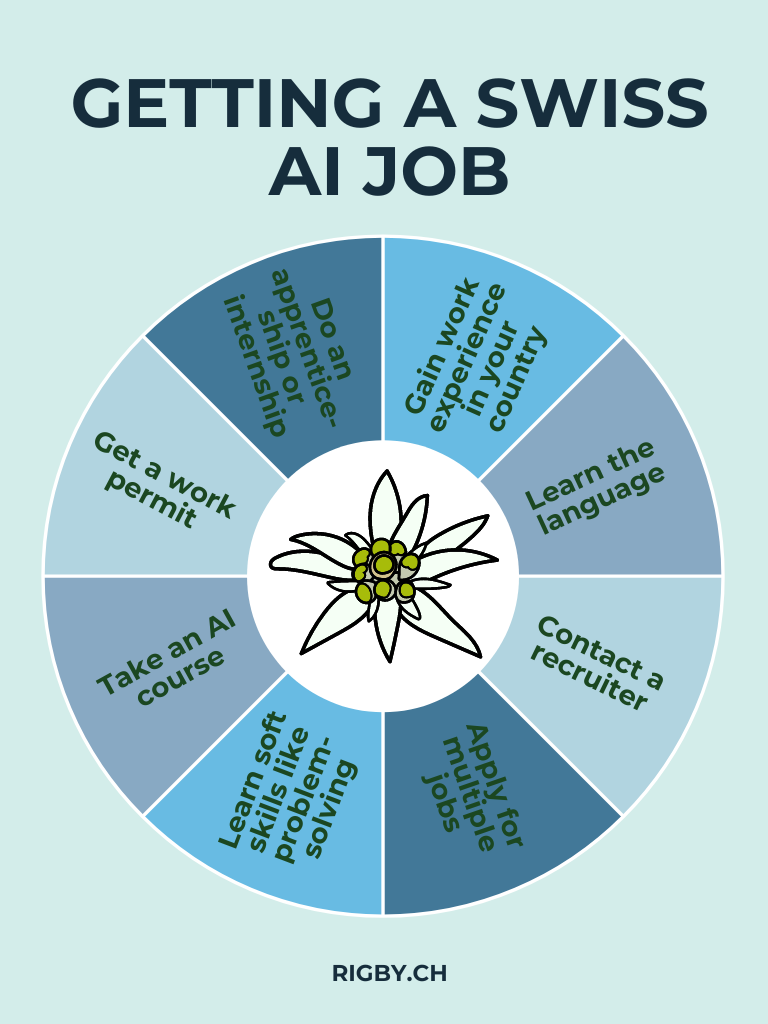How Do I Get My First AI Job in Switzerland?
Although there is a shortage of skilled IT workers, AI jobs in Switzerland are highly sought-after due to the excellent wages and great quality of life this country offers. Before you start applying for jobs, make sure you have the right degree, education, and language skills.

Prerequisites for AI Jobs in Switzerland
Swiss employers are struggling to find qualified IT professionals, but that doesn’t mean they’ll hire you if you’re not a good fit for the role or organisation. Studies have shown that most employers would rather leave a position unfilled than hire someone unsuitable. Education, experience, permission to work in Switzerland, and language skills are four of the biggest factors that may be considered during the selection process.
A Good Education and Relevant Experience
In Switzerland, most young people aiming to work in IT don’t go to university. Instead, they do an apprenticeship and, if they want to continue their education, a federal diploma. This is considered equivalent to a bachelor’s or master’s degree. You can likely find an AI job in Switzerland if you either already have a degree in computer science, data science, engineering, or a similar field, or you have five or more years of experience working as a computer scientist, media specialist, or another IT-related role.
IT Education in Switzerland
If you don’t yet have the relevant experience, you may be able to find an apprenticeship position in Switzerland. This typically takes four years, but the training is free, and you get a small wage.
AI-Specific Training
Some of the most relevant skills for AI jobs are:
- Programming
- Problem-solving
- Data processing and database modelling
- Machine learning
- Mathematics
- Natural language processing
Search for courses related to these fields at local universities and online. Additionally, consider signing up for AI courses such as these popular ones by Andrew Ng, a professor at Stanford University.
Permission to Work in Switzerland
Although highly skilled professionals can sometimes get visa sponsorship from an employer, this is very rare. To offer someone a work visa, Swiss employers first have to prove that no equivalent Swiss, EU, or EFTA worker could be found. Most expats employed in Switzerland are either EU or EFTA nationals, married to a Swiss person, or have Swiss roots and are therefore eligible for citizenship.
Language Skills
The main language requirement for many AI jobs in Switzerland is English, so you may be able to find a position even if you don’t speak German, French, or Italian. However, you’re more likely to get a good job if you have at least basic competency in one of these languages. This is because many of your coworkers and some of your clients may speak the local language.
You can start in your home country by either taking an online class or using an app. Once you’re in Switzerland, there are plenty of classes, courses, and language learning meetups.

The Application Process
Most AI and other IT jobs in Switzerland are posted on online job boards. Before you start applying, familiarise yourself with the types of jobs available and the most common requirements. If you’re a graduate or you don’t have many years of experience, working with a recruitment company is highly recommended since Swiss employers can be reluctant to hire junior employees from abroad. Additionally, some jobs are not made public, so you may not find out about them unless you contact a recruiter.
Visiting Switzerland versus Applying from Your Home Country
Unless you’re a highly sought-after expert, you won’t get invited to a job interview every time you apply. That’s why we recommend that you start applying from your home country if you don’t yet live in Switzerland, as moving there to look for a job could be expensive.
Job Interviews
Most AI jobs require several interviews. You might either start with a task or a video call. If you pass the first stages, you’ll likely be invited to the office for a final interview. If you get multiple offers, you can negotiate, but make sure you don’t give your future employer the impression that money is your main motivation.
Moving to Switzerland
As soon as you arrive in Switzerland, take your work contract, proof of ID, and proof of address to your local council. There, you can register as a resident and get your work permit.
Next, open a Swiss bank account. Since many banks charge high fees, it makes sense to compare providers through Moneyland and read up on your options on the Poor Swiss blog.
Finally, make sure to take out health insurance in your first three months. Otherwise, you’ll be assigned a policy that may not fit your needs. If you’re not sure how to get started with all these things, download our Living in Switzerland guide. It will provide you with a comprehensive overview.
Living in Switzerland on Your AI Salary
AI engineers with two or more years of experience earn upwards of CHF 120,000 a year. Senior-level employees sometimes earn multiple six figures. As a result, living in Switzerland on an AI salary isn’t hard, even in expensive areas like Zurich or Geneva.
Your biggest expense is likely to be housing. Before you accept a position and make your move, check what homes are available near your new workplace to find out how much you’re likely to spend. Remember that the transport system is excellent in Switzerland, so you may be able to live on the outskirts of the city or even in a different town, where rents are cheaper, and commute to your workplace within 30-45 minutes.
Will I Spend Much on Taxes in Switzerland?
Some high earners move to Switzerland because the taxes are lower than in many other developed countries. However, there isn’t a single Swiss tax rate. While federal taxes are indeed quite low, you also have to pay cantonal and municipal taxes. These vary greatly, so make sure you fully understand your tax rate based on where you live and how much you earn. Some cantons with very low taxes are Zug, Appenzell Innerrhoden, Obwalden, and Nidwalden. You’ll pay significantly more in Geneva, Basel, Vaud, and Bern.
An increasing number of companies are looking for AI engineers in Switzerland. If you work in this field, apply via the Rigby AG website. We’ll let you know if any suitable AI jobs in Switzerland become available.